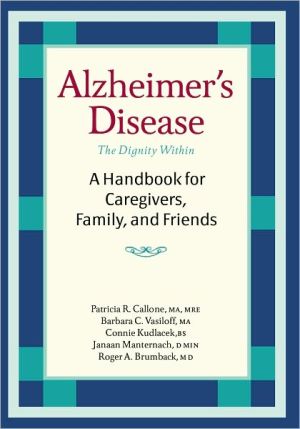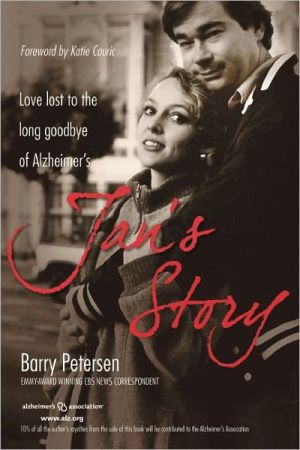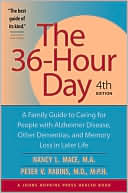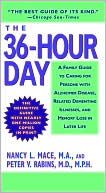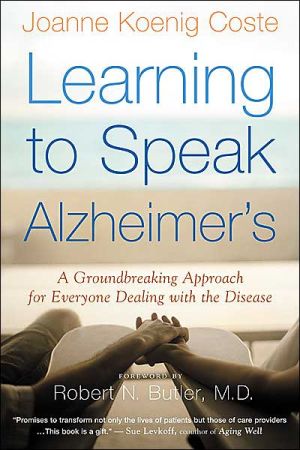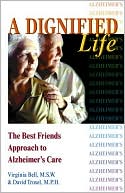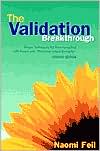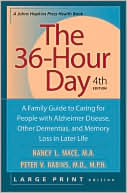Alzheimer's Disease: A Handbook for Caregivers, Family, and Friends
Of the estimated 5 million Americans who have Alzheimer's disease, more than 7 in 10 live at home, primarily cared for by family and friends. Alzheimer's Disease: The Dignity Within: A Handbook for Caregivers, Family, and Friends was written in a workbook format aimed at increasing the caregiver's knowledge of the disease. As a result, these caregivers - whether family members, friends or health professionals - will be better equipped to nurture the dignity within people living with...
Search in google:
Of the estimated 5 million Americans who have Alzheimer's disease, more than 7 in 10 live at home, primarily cared for by family and friends. Alzheimer's Disease: A Handbook for Caregivers, Family, and Friends features a workbook-type format aimed at increasing the caregiver's knowledge of the disease. As a result, these caregivers — whether family members, friends or health professionals — will be better equipped to nurture the dignity within people living with Alzheimer's and feel more confident doing so. The book is a tool for caregivers that will impact not only the way they relate to persons with Alzheimer's disease, but other relationships as well. Doody Review Services Reviewer:David O. Staats, MD(University of Oklahoma Health Sciences Center)Description:This is a multiauthored book written for and about caregivers whose loved ones have Alzheimer's disease.Purpose:The purpose is to explore the nature of caregiving and offer advice to caregivers in how to approach their loved ones with Alzheimer's disease and other dementing illnesses.Audience:The audience is primarily caregivers and, in turn, those who advise, comfort, and care for caregivers. The authors are all experienced and craft their knowledge in effective ways.Features:The book is divided into five parts: advice for caregivers; a personal story from a caregiver; relationships among the affected individual, the caregiver, and the rest of the family; styles of caregiving; and finally, an explanation of how the brain and its function changes with the progression of Alzheimer's disease.Assessment:This book is lovingly crafted, gentle and compassionate in its approach. It shows religion and spirituality that live through action. So often, we concentrate on the demented person, not realizing the truth of "the family is the unit of treatment." The caregiving spouse not only has to provide care, but, as the Alzheimer's disease progresses, loses the ability to converse (the dement is no longer conversant). The caregiving spouse also loses the mirror of his or her own goodness that the now demented person used to reflect so glowingly. We have only begun to know how to help caregivers because we have focused our attention mostly on the dement. This book insightfully turns our attention in the right direction. I think it represents the wave of the future
Sections I. Being A Caregiver: Challenges and Solutions Meet Patricia (Pat) Callone, M.A., M.R.E The Special Journey of Caregivers to Persons with Alzheimer's Disease or Related Dementia A Dozen Tips for Caregivers II. True Stories: Relationships Between Persons Affected by the Disease, Their Caregivers, Family Members, and Friends Meet Connie Kudlacek, B.S Reading the Stories Summary Page III. Caregiving Styles: Three Ways To Respond Meet Barbara C. Vasiloff, M.A. IV. Alzheimer's Disease: Changes In The Brain Meet Roger A. Brumback, M.D A Dialogue With Dr. Roger A. Brumback
\ From The CriticsReviewer: David O. Staats, MD(University of Oklahoma Health Sciences Center)\ Description: This is a multiauthored book written for and about caregivers whose loved ones have Alzheimer's disease.\ Purpose: The purpose is to explore the nature of caregiving and offer advice to caregivers in how to approach their loved ones with Alzheimer's disease and other dementing illnesses.\ Audience: The audience is primarily caregivers and, in turn, those who advise, comfort, and care for caregivers. The authors are all experienced and craft their knowledge in effective ways.\ Features: The book is divided into five parts: advice for caregivers; a personal story from a caregiver; relationships among the affected individual, the caregiver, and the rest of the family; styles of caregiving; and finally, an explanation of how the brain and its function changes with the progression of Alzheimer's disease.\ Assessment: This book is lovingly crafted, gentle and compassionate in its approach. It shows religion and spirituality that live through action. So often, we concentrate on the demented person, not realizing the truth of "the family is the unit of treatment." The caregiving spouse not only has to provide care, but, as the Alzheimer's disease progresses, loses the ability to converse (the dement is no longer conversant). The caregiving spouse also loses the mirror of his or her own goodness that the now demented person used to reflect so glowingly. We have only begun to know how to help caregivers because we have focused our attention mostly on the dement. This book insightfully turns our attention in the right direction. I think it represents the wave of the future\ \ \ 3 Stars from Doody\ \
